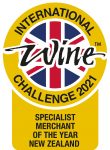No products in the cart.
Tryjanuary - Our hit-list
Exclusive interviews with New World Producers about what being Vegan means for them.
Well what a start to the year! We came into 2021 with such optimism and grace and BANG another lockdown for the UK. But, at least we have good wine right? This January, we’re honing in our range of vegan wines and boy is it a good one!
To kick off the festivities, here’s a cheeky blog tributing to all our incredible producers far and wide… Have a read and get those tastebuds tingling for a bottle of adult juice.
Here’s us chatting away with winemaker Tamra, from Seresin Estate. If only we were covered in the warmth of Marlborough sun right about now, right? 💛
Mel: What does being Vegan mean for your winery in one word?
Tamra: Non-violence
Mel: What growth have you seen for Vegan wines as a whole in New Zealand?
Tamra: In NZ, we have definitely seen the knowledge and interest in vegan wines really increase in the past few years. Some wine brands even declare that the wines are vegan on the front label, so in full view of the consumer. There are now some restaurants that dedicate their wine lists to Vegan wines following the desire for vegan food offerings.
Mel: What does the wine growing process look like for you?
Tamra: Well, we certainly adopt the phrase ‘minimum intervention and maximum attention!’ Our grapes are grown and certified organic and so are grown as in sync with nature and the natural rhythms as much as possible. This follows through into the winery, where we are using as much of the natural product as possible – a lot of lees, native yeasts and also neutral barrels, puncheons and amphora pots. This aids in creating wines that are as true to the vineyard site as possible.
Mel: What would you say is the difference between a Vegan wine and a non-vegan wine?
Tamra: Hopefully, being Vegan, the wines have been ‘fined’ less and the winemaking has been approached in a more mindful way, so the wines should in theory have more dimensions to them and be less ‘commercial’ .
Mel: What’s the easiest way to describe the difference between Organic and Vegan wines and the wine growing process?
Tamra: There is a huge difference. Just because a wine is Vegan, this does not mean it is Organic (I think it should be personally) and not all Organic wines are Vegan. Hopefully there is some cross over though! All the wines we make (and we are 100% organic) are also made Vegan in the winery. So – Organic wines are produced from grapes that have been true to the environment and earth, grown without the use of pesticides, chemical fertilisers, and herbicides. Vegan wines, however, can come from grapes grown under any circumstances but are made in the winery without the use of any products that are derived from animals, eggs, milk and fish.
Our go to’s from Marlborough? Well it would be rude not to add Seresin into the mix wouldn’t it? Chardonnay and Rachel Pinot Noir are on sale for up to 15% off for the whole of January! Shop our full range of Vegan wines from Marlborough here
Talking the talk with Nick Mills from Rippon Vineyards, Central Otago.
Mel: What does being Vegan mean for your winery in one word?
Nick: Happiness. We love being farmers who grow grapes and make wine. It’s an enjoyable way to maintain a relationship with a piece of land, but it’s also a rewarding and meaningful way to live a life. That our wines can be described as vegan is another happy by product of a craft we get a huge amount of enjoyment from.
Mel: What does the wine growing process look like for you?
Nick: For us (a family that has been on Rippon for five generations) it’s about maintaining an ongoing relationship with a healthy, beautiful piece of land. Rippon wine is simply a product of this love and care.
Mel: What would you say is the difference (if any) between a Vegan wine and a non-vegan wine?
Nick: A vegan wine is one that has used no animal products in the wine-making process. A non-vegan wine is one that has used animal products in the wine-making process.
This simple definition belies many more complexities, for the wine-making process itself is just a small part of overall wine production. All agriculture or viticulture will of course, in some way, impact land and the life on it. but a vegan wine loses its value if the land it comes from has been cleared of life and maintained as a strict monoculture with significant chemical inputs. Well-considered organics and biodynamics seek to maximise the positive impacts humans can have on land, including its domesticated and wild animals, so it’s really important to look for these as well. And in many ways, it’s up to you. Yes you. Your purchase decision will have an impact on land somewhere, and the life on it.
To borrow from Wendell Berry: “drinking wine is an agricultural act.”
To shop all available Vegan wines from Central Otago click here. But our top picks you ask? Well we do have a secret allocation of wines from our pals over in Felton Road… yeah we kept that one a secret didn’t we? Shop our full range here, and read more about why these wines are so special here
Chatting away with Pen Naish from Black Estate, North Canterbury, NZ
Mel: What does being Vegan mean for your winery in one word?
Pen: No animal products used in growing or making our wines.
Mel: What growth have you seen for Vegan wines as a whole in New Zealand?
Pen: The demand is consistently growing.
Mel: What does the wine growing process look like for you?
Pen: Working with our vines in the growing season to ensure we have ripe and disease free grapes at harvest, using only certified organic, animal free products in the vineyards. In the winery, with our focus on harvesting only quality produce, the wine making process is simple, so we don’t need to use any additives, like animal derived fining agents.
Mel: What would you say is the difference between a Vegan wine and a non-Vegan wine?
Pen: More purity and truth.
Mel: What’s the easiest way to describe the difference between Organic and Vegan wines and the wine growing process?
Pen: Organic wines use organic fruit but may use additives in the winemaking process which include animal derived ingredients. Vegan wines don’t use any animal products, for example fish and or egg which are usually used to fine the wines. Vegan wines could be conventionally grown or made and are often not organic.
Our wines happen to be vegan because we choose not to add additives to our wines, except for minimal organic sulphur, just at bottling. Then we can taste the intrinsic quality and flavour of the fruit grown that season, and there is less interference from ingredients that don’t relate to our place or season. As a result we have always had great support from vegans and have learned a lot about the effect of industrial animal farming on the planet. We now offer vegan dishes in our winery restaurant too in an effort to help care for the planet and offer the consumer wine and experiences that can help all of us lessen industrial agricultural load on our planet.
Watch our Black Estate Live Wine Tasting Here
We couldn’t forget about Australia could we? We caught up with Dandelion Vineyards and learnt about their transition to a full vegan collection.
Oh you didn’t think this was over did you? We might be loving New Zealand wine now and forevermore, but we can’t neglect our pals over in Australia… and especially this banging producer! We talked to Dandelions Vineyards who have made a pledge of making all their wines vegan as of their 2020 vintage, considering their red wines are already classified as vegan friendly.
Mel: What growth have you seen for Vegan wines as a whole in your region/country?
Elena: Vegan friendly wines are certainly a growing trend in Australia.
Mel: What does the wine growing process look like for you?
Elena: Our winemaking philosophy is very simple and focussed on vineyard, variety and region. We keep things simple and with minimal intervention when possible. We ferment the grapes, mature them according to the different varieties and styles; the reds are bottled with no fining agents added and we also don’t filter the majority of our wines because we believe that the extra processing takes away from the goodness and purity of the wine. With white varieties, we still typically have some fining agents which we have recently changed to plant based.
Mel: What would you say is the difference (if any) between a Vegan wine and a non-Vegan wine?
Elena: That is very hard to quantify because you can look at two different wines coming from the same vineyard from two different winemakers and they can look completely different. So, as far as quality and difference, this is hard to determine.
Mel: What’s the easiest way to describe the difference between Organic and Vegan wines and the wine growing process?
Elena: Vegan wines do not use the traditional fining products that are milk, egg, or fish based. We have never used any of these products on our red wines, but we have used them in the past for our whites as they help take out the bitterness that you can sometimes get on the palate. However, we have finally found a plant based product which gives the same results, hence the change of direction.
Share on facebook
Facebook
Share on twitter
Twitter
Share on linkedin
LinkedIn















